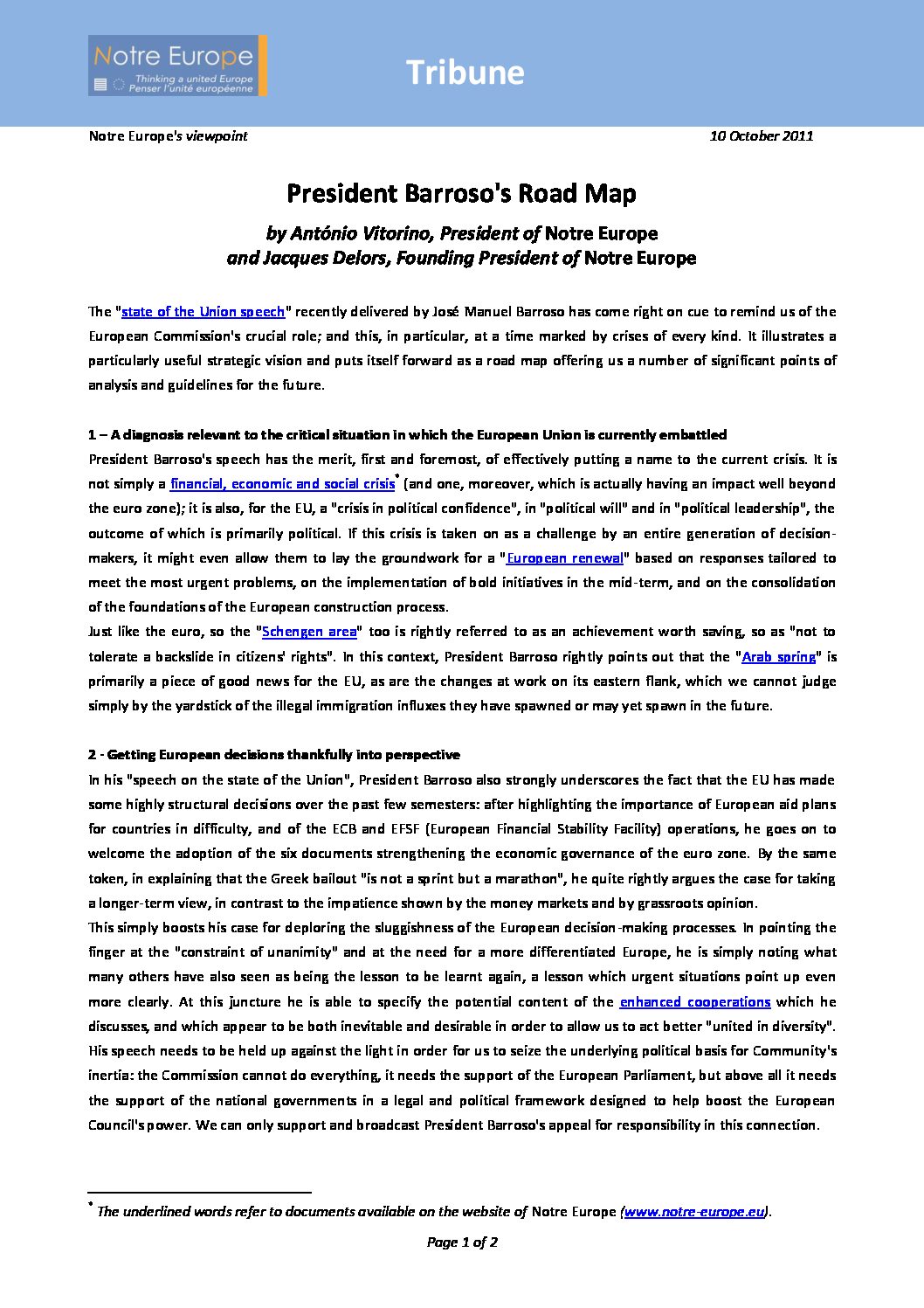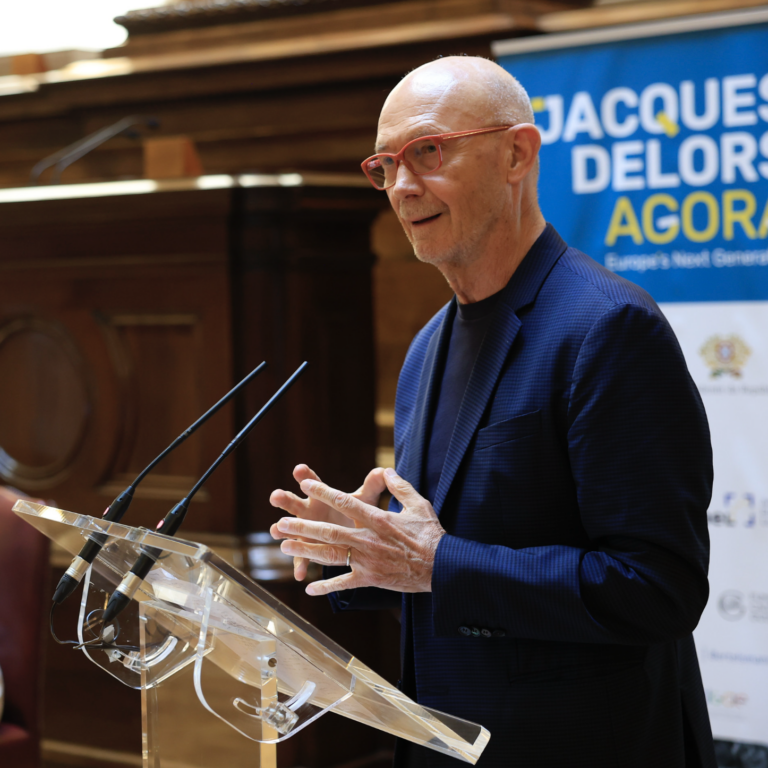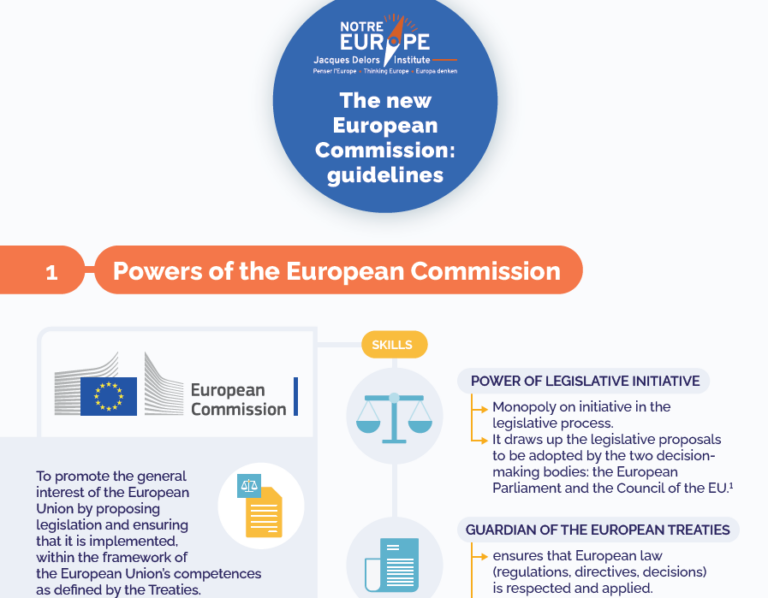Blog post
President Barroso’s Road Map
The “state of the Union speech”delivered by José Manuel Barroso has come right on cue to remind us of the European Commission’s crucial role. It illustrates a particularly useful strategic vision and puts itself forward as a “road map” in which António Vitorino and Jacques Delors identify number of significant points of analysis and guidelines for the future
The “state of the Union speech” recently delivered by José Manuel Barroso has come right on cue to remind us of the European Commission’s crucial role; and this, in particular, at a time marked by crises of every kind. It illustrates a particularly useful strategic vision and puts itself forward as a road map offering us a number of significant points of analysis and guidelines for the future.
1 – A diagnosis relevant to the critical situation in which the European Union is currently embattled
President Barroso’s speech has the merit, first and foremost, of effectively putting a name to the current crisis. It is not simply a financial, economic and social crisis (and one, moreover, which is actually having an impact well beyond the euro zone); it is also, for the EU, a “crisis in political confidence”, in “political will” and in “political leadership”, the outcome of which is primarily political. If this crisis is taken on as a challenge by an entire generation of decision-makers, it might even allow them to lay the groundwork for a “European renewal” based on responses tailored to meet the most urgent problems, on the implementation of bold initiatives in the mid-term, and on the consolidation of the foundations of the European construction process.
Just like the euro, so the “Schengen area” too is rightly referred to as an achievement worth saving, so as “not to tolerate a backslide in citizens’ rights”. In this context, President Barroso rightly points out that the “Arab spring” is primarily a piece of good news for the EU, as are the changes at work on its eastern flank, which we cannot judge simply by the yardstick of the illegal immigration influxes they have spawned or may yet spawn in the future.
2 – Getting European decisions thankfully into perspective
In his “speech on the state of the Union”, President Barroso also strongly underscores the fact that the EU has made some highly structural decisions over the past few semesters: after highlighting the importance of European aid plans for countries in difficulty, and of the ECB and EFSF (European Financial Stability Facility) operations, he goes on to welcome the adoption of the six documents strengthening the economic governance of the euro zone. By the same token, in explaining that the Greek bailout “is not a sprint but a marathon”, he quite rightly argues the case for taking a longer-term view, in contrast to the impatience shown by the money markets and by grassroots opinion.
This simply boosts his case for deploring the sluggishness of the European decision-making processes. In pointing the finger at the “constraint of unanimity” and at the need for a more differentiated Europe, he is simply noting what many others have also seen as being the lesson to be learnt again, a lesson which urgent situations point up even more clearly. At this juncture he is able to specify the potential content of the enhanced cooperations which he discusses, and which appear to be both inevitable and desirable in order to allow us to act better “united in diversity”. His speech needs to be held up against the light in order for us to seize the underlying political basis for Community’s inertia: the Commission cannot do everything, it needs the support of the European Parliament, but above all it needs the support of the national governments in a legal and political framework designed to help boost the European Council’s power. We can only support and broadcast President Barroso’s appeal for responsibility in this connection.
3 – A global strategy to emerge from the crisis in the Economic and Monetary Union (EMU)
The passages relating to the EMU crisis in the “speech on the state of the Union” also point to the basic ingredients in a global response:
- EFSF and European Central Bank interventions followed by the entry into force of the European Stability Mechanism (ESM), under the heading “bailout”, to participate, in particular, in the recapitalisation of banks;
- A reform of the Stability Pact and the implementation of the “Euro plus pact” and of the “EU2020” agenda to strengthen the EMU’s economic pillar, with the Commission necessarily adopting a more aggressive approach to the whole issue;
- A proposal for “European bonds” leading to the mutualisation of a part of the debt incurred by countries in the euro zone, the issue of which will be seen as logical and beneficial once common discipline is fully complied with;
- The taxation of financial transactions and the adoption of a reform of financial regulation and oversight methods, the multiple defaults in which are one of the causes of the current economic crisis.
President Barroso is aware that the implementation of some of these guidelines entails a change in the treaties – a change already required for the ESM – and he takes care to point out that the launch of a major “institutional negotiation” is something of a medium-term issue. By contrast, he states quite firmly that “the Commission is the economic government of the euro zone”, precisely at a time when the governance of the monetary union seems to rest on interaction among several different institutions. The need to rapidly agree on the “practical arrangements” necessary in terms of crisis handling and economic policy coordination will probably lead, in this connection, to a less centralised mechanism (and a mechanism, moreover, which needs first and foremost to guarantee the existence of a perfectly efficient and legitimate European “chain of command”.)
4 – The “Barroso package” for growth
The final plus point in this “speech on the state of the Union” is that it formulates the essential “growth package” that Europe’s member states and citizens both need. The EU is particularly well placed to act in this regard, in a context in which there is a drastic shortage of opportunities for Keynesian stimulation at the national level; President Barroso points out that the EU is going to have to take several crucial decisions in 2012:
- imparting a boost to, and extension of, the single market 20 years after its deepening in 1992, in order to help it to benefit from its still underexploited growth potential, particularly in terms of services and of the digital economy, not to mention in the sphere of defence;
- adopting the multiannual financial framework for the period 2014-2020 in order to accompany the extension of the single market and to fund investments of common interest, especially in the sphere of transport and energy infrastructures;
- improving the use of non-budgetary funding instruments, including EIB loans and “project bonds”, for which concrete proposals are going to be submitted by the Commission in the coming weeks.
But aside from the speech’s individual proposals, the only real complaint that one can voice is that such a comprehensive strategy was not formulated and publicised sooner. The “speech on the state of the Union” is inevitably delivered on a set date, but in so doing, it gains in solemnity what it loses in reactivity. Having said that, we may sincerely hope that the heads of state and government leaders display a similarly all-embracing vision and perspective – the European Council on 17 and 18 October will provide them with the perfect opportunity to show us their mettle in that respect.
SUR LE MÊME THÈME
ON THE SAME THEME
PUBLICATIONS
A powerful Europe, now or never

Reflecting on the future of the European Union in light of Jacques Delors’ legacy

The new European Commission: guidelines

MÉDIAS
MEDIAS
Jacques Delors en son institut

Enrico Letta – Ceux qui s’inquiètent pour l’Europe…

UE : nouvelles équipes, nouveaux équilibres

ÉVÉNEMENTS
EVENTS
Les rendez-vous de la Rep | Meeting with Nicole Gnesotto [FR]

WEBINAR | The day after the European Commission’s Post-Covid economic recovery proposal

Paris, 5 November 2019 – How to finance Energy Innovation in Europe in order to reach Climate neutrality by 2050?
















